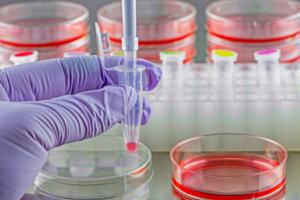The Company has closely collaborated with leading research groups in Norway, Europe and the United States of America, executing projects that have revealed novel insights for the mode of action and potential uses of beta-glucans.
Since the early 90’s, beta-1,3/1,6-glucan has been introduced as a feed additive to improve health and performance of farmed shrimp, fish, pigs, chicken, laying hens and calves, and of horses and pet animals. Building upon the foundation it laid in animal health and consumer products, Biotec BetaGlucans has invested major resources in R&D to better understand how beta-1,3/1,6-glucan’s modulation of immune mechanisms can be used to treat or prevent immune-related disorders and diseases*. As a result, the company has developed beta-1,3/1,6-glucan products for human consumption and advanced wound healing.
Building upon the foundation it laid in animal health and consumer products, Biotec BetaGlucans has invested major resources in R&D to better understand how beta-1,3/1,6-glucan’s modulation of immune mechanisms can be used to treat or prevent immune-related disorders and diseases*. As a result, the company has developed beta-1,3/1,6-glucan products for human consumption and advanced wound healing.
M-Gard® is supported by a numerous of animal and human trials and in various applications including safety and mechanism-of-action studies. The vast majority of our studies and trials have been published in peer-reviewed science or medical journals. The technology behind M-Gard® has been successfully developed for several alternative indications and applications including nutraceuticals (enhanced resistance against infections*), wound care (improved healing of chronic wounds), immunotherapy (cancer treatment*), as well as treatment of oral mucositis* and certain bowel diseases*. For more information, please consult: solublebetaglucan.com.
Some scientific studies done with beta-glucan from Biotec BetaGlucans
- Yu X, et al., Oral administered particulate yeast-derived glucan promotes hepatitis B virus clearance in a hydrodynamic injection mouse model. PLoS One. 2015;10(4).
- Tsukada C, et al., Immunopotentiation of intraepithelial lymphocytes in the intestine by oral administrations of beta-glucan. Cell Immunol. 2003;221(1):1-5.
- Lehne G, et al., Oral administration of a new soluble branched beta-1,3-D-glucan is well tolerated and can lead to increased salivary concentrations of immunoglobulin A in healthy volunteers. Clin Exp Immunol. 2006;143(1):65-69.
- Sandvik A, et al., Oral and systemic administration of beta-glucan protects against lipopolysaccharide-induced shock and organ injury in rats. ClinExpImmunol. 2007;148(1):168-177.
- Harnack U, et al., Oral administration of a soluble 1-3, 1-6 β-glucan during prophylactic survivin peptide vaccination diminishes growth of a B cell lymphoma in mice. Int Immunopharmacol. 2009;9(11):1298-303.
- Harnack U, et al., Comparison of the effect of orally administered soluble beta-(1-3),(1-6)-D-glucan and of G-CSF on the recovery of murine hematopoiesis. In Vivo.2010;24(1):59-63.
- Hetland G, et al., beta-1,3-Glucan reduces growth of Mycobacterium tuberculosis in macrophage cultures. FEMS Immunol Med Microbiol. 2002;33(1):41-45.
- Marakalala MJ, et al., Dectin-1 plays a redundant role in the immunomodulatory activities of β-glucan-rich ligands in vivo. Microbes Infect. 2013;15(6-7):511-5.
- Aarsaether E, et al., Cardioprotective effect of pretreatment with beta-glucanin coronary artery bypass grafting. Scand Cardiovasc J. 2006;40(5):298-304.
- Engstad CS , et al., The effect of soluble beta-1,3-glucan and lipopolysaccharide on cytokine production and coagulation activation in whole blood. Int Immunopharmacol. 2002;2(11):1585-1597.
- Harnack U, et al., Yeast-derived Beta-(1-3),(1-6)-D-glucan Induces Up-regulation of CD86 on Dectin-1-positive Human B-Lymphoma Cell Anticancer Res. 2011;31(12):4195-9.
- Ozment TR, et al., Soluble Glucan Is Internalized and Trafficked to the Golgi Apparatus in Macrophages via a Clathrin-Mediated, Lipid Raft-Regulated Mechanism. J Pharmacol Exp Ther. 2012;342(3):808-15.
- Fagone P, et al., Acceleration of SLE-like syndrome development in NZBxNZW F1 mice by beta-glucan. 2014;23(4):407-11.
- Kushner BH, et al., Phase I Trial of a Bivalent Gangliosides Vaccine in Combination with β-Glucan for High-Risk Neuroblastoma in Second or Later Remission. Clin Cancer Res. 2014;20(5):1375-82.
- Preus HR, et al., A randomized, single-blind, parallel-group clinical study to evaluate the effect of soluble beta-1,3/1,6-glucan on experimental gingivitis in man. J Clin Periodontol. 2008;35(3):236-241.
- Breivik T, et al., Soluble beta-1,3/1,6-glucan from yeast inhibits experimental periodontal disease in Wistarrats. J Clin Periodontol. 2005;32(4):347-352.
- Berdal M, et al., Aminated beta-1,3-D-glucan improves wound healing in diabetic db/dbmice. Wound Repair Regen. 2007;15(6):825-832.
- Zykova SN, et al., Macrophage stimulating agent soluble yeast beta-1,3/1,6-glucan as a topical treatment of diabetic foot and leg ulcers: A randomized, double blind, placebo-controlled phase II study. J Diabetes Investig. 2014;5(4):392-399.
- Harnack U, et al., Beta-(1-3),(1-6)-D-glucan enhances the effect of low-dose cyclophosphamide treatment on A20 lymphoma in mice. Anticancer Res.2011;31(4):1169-72.
- Ragupathi G, et al., Evaluation of Widely Consumed Botanicals as Immunological Adjuvants. Vaccine. 2008; 26(37): 4860–4865.
- Harnack U, et al., Role of Soluble β-(1-3),(1-6)-D-Glucan from Saccharomyces cerevisiae in the Murine P388 Ascites Tumor Model. In Vivo. 2011;25(2):185-9.
- Harnack U, et al., IL-1 Receptor Antagonist Anakinra Enhances Tumour Growth Inhibition in Mice Receiving Peptide Vaccination and β-(1-3),(1-6)-D-Glucan. Anticancer Res.2010;30(10):3959-65.